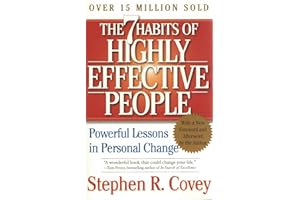One Sentence Summary
The 7 Habits of Highly Effective People: Powerful Lessons in Personal Change is a self-improvement and management guide book by Stephen R. Covey which introduces a holistic, integrated, principle-centered approach for solving personal and professional problems.
Book Genre
Self-help book
Main Topic of the Book
The 7 Habits of Highly Effective People is a self-help book exploring the importance of personal responsibility and developing virtues in leadership.
Key Ideas
- Focus on fundamental principles for effectiveness, rather than quick band-aid solutions
- Develop a character based on values of fairness, integrity and service
- Understand the interconnectedness of all aspects of life
- Take responsibility for personal growth and development
- Detect and develop synergy between personal, family, and organizational goals
Main Parts of the Book and a Short Summary
The 7 Habits of Highly Effective People starts by describing the differences between the ineffective and the effective people. It then presents the 7 Habits; habits for success and effectiveness.
- Habit 1 – Be Proactive encourages readers to take responsibility for their own life and break free from any external influences to increase self-awareness and personal efficacy.
- Habit 2 – Begin With The End In Mind encourages readers to determine their own life goals and take the necessary steps to achieve them.
- Habit 3 – Put First Things First teaches readers to prioritize their tasks in order to be more productive.
- Habit 4 – Think Win-Win encourages readers to have an attitude of win-win solutions for their own problems and those of others.
- Habit 5 – Seek First To Understand Then To Be Understood encourages readers to always maintain a level of understanding and compassion for others.
- Habit 6 – Synergize teaches readers to respect the differences between themselves and others, and to use these differences to create successful, promotion-oriented solutions.
- Habit 7 – Sharpen The Saw encourages readers to practice habits of self-renewal, such as exercising, practicing good nutrition, and spiritual growth.
Key Takeaways
- The importance of personal responsibility to enhance the effectiveness of an individual.
- The interconnectedness of all aspects of life.
- The value of ongoing self-renewal to promote personal growth and development.
- The strategy of seeking win-win solutions to provide long-term rewards and value.
Author’s Background and Qualifications
Stephen R. Covey (1932-2012) was an inspirational author and sought-after speaker who wrote numerous books on issues related to work and family. He held a Bachelor’s degree from University of Utah, a Master’s degree from Brigham Young University, and a Doctorate in Education from Brigham Young University. He was well-known for his works in leadership, human development, and personal effectiveness, including his works, Seven Habits of Highly Effective People, First Things First, Principle-Centered Leadership, and 7 Habits of Highly Effective Families.
Target Audience
The 7 Habits of Highly Effective People is a self-improvement book for people from all walks of life who wish to develop personal responsibility, emotional and physical well-being, relationships, and leadership skills.
Publisher and First Publication Date
Simon and Schuster published Seven Habits of Highly Effective People in 1989 and first published it in the United States.

